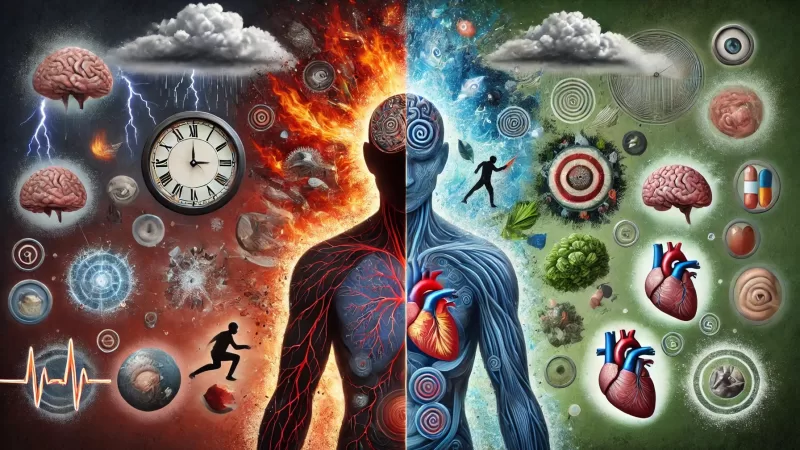The Effects of Stress and Trauma on the Body and Mind

Stress and trauma are pervasive experiences that can significantly impact both physical and mental health. Understanding how they affect the body and mind is crucial for developing effective coping mechanisms and treatment strategies. This article delves into the mechanisms behind stress and trauma, their short- and long-term effects, and potential pathways to healing. For an article relating to the pressures of working within the creative industries, click here
Understanding Stress and Trauma
Stress is the body’s response to external pressures, known as stressors, which can be physical, emotional, or psychological. It triggers a cascade of hormonal changes. These changes primarily involve the hypothalamic-pituitary-adrenal (HPA) axis. As a result, stress hormones like cortisol and adrenaline are released.
Trauma, on the other hand, refers to the psychological and physiological response to deeply distressing or disturbing events. Trauma can stem from experiences such as physical or emotional abuse, natural disasters, accidents, or significant loss. While not everyone who experiences stress or trauma will develop mental health issues, the risk is heightened.
The Physiology of Stress
When faced with a stressor, the body enters a state of “fight or flight,” preparing to respond to perceived threats. This involves several physiological changes:
Increased Heart Rate and Blood Pressure: The heart pumps faster to supply more blood to vital organs and muscles.
Altered Respiratory Rate: Breathing may become rapid and shallow, increasing oxygen intake.
Immune System Suppression: Chronic stress can weaken the immune response, making the body more susceptible to infections and diseases.
Muscle Tension: Prolonged muscle tension can lead to pain and discomfort, often resulting in headaches or back pain.
Digestive Changes: Stress can disrupt the digestive system, leading to issues like stomach aches, constipation, or diarrhea.
The Psychological Impact of Stress and Trauma
The psychological effects of stress and trauma can manifest in several ways, often leading to emotional and mental health challenges:
Anxiety Disorders: Chronic stress can lead to generalized anxiety disorder, panic attacks, and other anxiety-related conditions.
Depression: Prolonged exposure to stress or trauma is strongly linked to the development of depressive disorders. Symptoms can include persistent sadness, loss of interest, and feelings of worthlessness.
Post-Traumatic Stress Disorder (PTSD): A specific type of anxiety disorder that may develop after experiencing or witnessing a traumatic event. Symptoms include flashbacks, nightmares, severe anxiety, and uncontrollable thoughts about the event.
Cognitive Impairments: Stress can impair cognitive functions, such as attention, memory, and decision-making. Traumatic experiences can also lead to difficulties in concentration and learning.
Emotional Dysregulation: Individuals may struggle with controlling their emotions, leading to mood swings, irritability, and difficulty in interpersonal relationships.
The Long-Term Consequences
Both chronic stress and unresolved trauma can lead to long-term health consequences, including:
Cardiovascular Issues: Chronic stress increases the risk of heart disease. It also leads to hypertension and stroke. This occurs due to persistent high blood pressure and inflammation.
Metabolic Disorders: Stress can contribute to weight gain and obesity. It triggers cravings for high-fat, high-sugar foods. Stress also disrupts sleep patterns.
Chronic Pain Conditions: Conditions such as fibromyalgia and chronic fatigue syndrome have been linked to stress. Trauma often exacerbates physical symptoms.
Autoimmune Diseases: There is evidence suggesting that chronic stress may trigger or exacerbate autoimmune conditions. In these conditions, the body’s immune system attacks healthy cells.
Mental Health Disorders: Long-term exposure to stress or trauma significantly increases the risk of developing severe mental health disorders. These disorders require comprehensive treatment approaches.
Pathways to Healing
Understanding the impact of stress and trauma is essential for recovery. Here are several approaches that can promote healing:
Therapeutic Interventions:
Cognitive Behavioural Therapy (CBT): Helps individuals reframe negative thoughts and behaviours associated with stress and trauma.
Eye Movement Desensitization and Reprocessing (EMDR): A specific therapy for PTSD that involves processing distressing memories through guided eye movements.
Mindfulness and Relaxation Techniques: Practices like meditation, yoga, and deep-breathing exercises can help reduce stress levels and promote emotional regulation.
Physical Activity: Regular exercise can alleviate stress and improve mood by releasing endorphins, enhancing overall physical health.
Social Support: Building strong support networks with friends, family, or support groups can help provide emotional resilience. They also foster a sense of belonging.
Healthy Lifestyle Choices: Adequate sleep, balanced nutrition, and avoiding substances like alcohol or drugs. These choices can help manage stress. They also promote recovery.
Conclusion
Stress and trauma profoundly affect both the body and mind, leading to a range of physical and psychological challenges. Recognizing the signs and understanding the mechanisms behind these experiences is the first step toward healing. By employing a variety of therapeutic approaches, individuals can work toward recovery. Through lifestyle changes, they can ultimately regain control over their health and well-being. Addressing the effects of stress and trauma is crucial for individual recovery. It is also important for fostering resilience within communities.